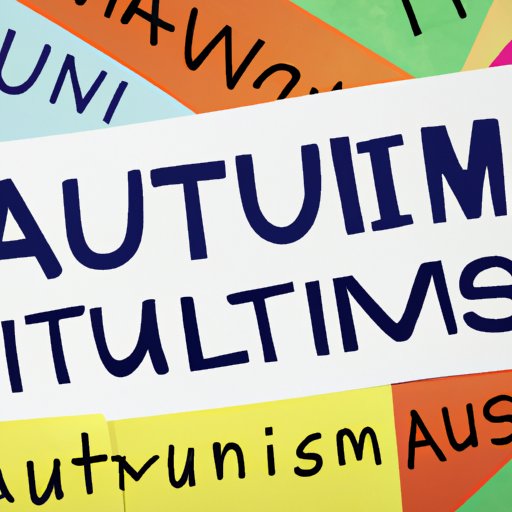
I. Introduction
Autism is a complex, lifelong condition that affects communication, social interaction, and behavior. It is often accompanied by other mental health conditions, such as anxiety and depression. However, there is much debate about whether autism should be classified as a mental illness. In this article, we will explore this topic in depth, debunk common myths, and offer practical tips for supporting neurodiverse individuals.
II. The Link Between Autism and Mental Health: Understanding the Connection
Autism and mental illness are often linked, but they are not the same thing. While autism is a developmental condition that affects the way the brain processes information, mental illness refers to a wide range of conditions that affect mood, thought, and behavior.
Despite this distinction, there are several ways in which autism and mental health are interconnected. For example, up to 70% of individuals with autism also experience anxiety, depression, or another mental health condition.
Recent research has also shown that autism and mental illness may share some common biological pathways. For example, both conditions have been linked to abnormalities in neurotransmitters, which are chemicals that send signals in the brain.
III. Debunking the Myths: Why Autism Shouldn’t Be Labeled a Mental Illness
There are several common myths surrounding autism and mental illness that contribute to the confusion surrounding this topic. For example, some people believe that autism is a type of mental illness or that individuals with autism are inherently violent or dangerous.
However, these myths are not supported by the evidence. Autism is a developmental condition and should not be classified as a mental illness. Furthermore, there is no evidence to suggest that individuals with autism are more likely to be violent than the general population.
It is important to use correct terminology when discussing autism and mental health in order to promote accurate understanding and reduce stigma.

IV. The Neurodiversity Movement: Redefining the Perception of Autism and Mental Health
The neurodiversity movement is a social movement that seeks to promote the acceptance and understanding of individuals with neurological differences, including autism. This movement challenges traditional views of autism as a disorder or deficit and instead promotes the idea of neurodiversity – the idea that neurological differences are a natural part of human diversity.
The neurodiversity movement has important implications for our understanding of autism and mental health. By promoting acceptance and destigmatization, the neurodiversity movement can help individuals with autism feel more empowered, valued, and accepted by society.
However, some critics argue that the neurodiversity movement may overlook the challenges that individuals with autism and mental health conditions face. They also point out that the movement may not be applicable to all individuals with autism, particularly those with more severe impairments.
V. Autism and Mental Health: The Importance of Early Intervention and Treatment
Early intervention and treatment are critical for individuals with autism and mental health conditions. Early diagnosis and intervention can help individuals develop skills and coping mechanisms that can improve their quality of life and reduce the risk of negative outcomes such as unemployment and social isolation.
There are many different types of interventions and treatments available for individuals with autism and mental health conditions, including therapy, medication, and support groups. It is important to work with a qualified healthcare provider to determine the best course of treatment for each individual.
If you are concerned about a loved one with autism or mental health needs, there are many resources available to help you seek help. These may include autism support groups, mental health clinics, and community resources such as libraries and schools.
VI. Living with Autism and Mental Illness: Personal Experiences and Stories
Personal stories and experiences can provide valuable insights into the challenges and successes of living with autism and mental illness. Many individuals with autism and mental health conditions report experiencing stigma and discrimination, which can exacerbate symptoms and make it difficult to access the support they need.
However, there are also many inspiring stories of individuals with neurodiverse conditions who have learned to thrive and succeed in a world that may not always understand or accommodate their needs.
It is important to listen to and learn from these stories in order to promote greater understanding and support for individuals with autism and mental health needs.
VII. The Role of Stigma in Misunderstanding Autism as a Mental Illness
Stigma is a major barrier to understanding and support for individuals with autism and mental health needs. Stigma can lead to negative attitudes and beliefs, which can in turn lead to discrimination and exclusion from society.
It is important to combat stigma by educating ourselves and others about neurodiversity and promoting acceptance and inclusivity. This may involve challenging stereotypes and myths, advocating for greater support and accommodations, and fostering a more welcoming and supportive community for all individuals.
VIII. Supporting Neurodiverse Individuals: Strategies for Addressing Autism and Mental Health Needs
There are many practical strategies that individuals and communities can use to support neurodiverse individuals with autism and mental health needs. These may include creating a supportive and inclusive environment, advocating for accommodations and support, and promoting education and awareness about neurodiversity.
It is important to create an individualized plan for each individual’s unique needs and preferences. This may involve working with a healthcare provider, therapist, or other qualified professional to develop a comprehensive and effective plan for support and intervention.
IX. Conclusion
In conclusion, autism and mental illness are interconnected but distinct conditions. It is important to use correct terminology and promote accurate understanding in order to reduce stigma and support neurodiverse individuals.
The neurodiversity movement provides an important framework for understanding and accepting individuals with autism and other neurological differences. However, it is also important to recognize the challenges that individuals with autism and mental health conditions face and to provide support and intervention as early as possible.
By working together to foster a more inclusive and supportive community, we can promote greater understanding and acceptance of neurodiversity and help individuals with autism and mental health conditions thrive and succeed.
Join us in promoting education and understanding about autism and mental health needs, and let’s work together to build a more inclusive and supportive society for all.




